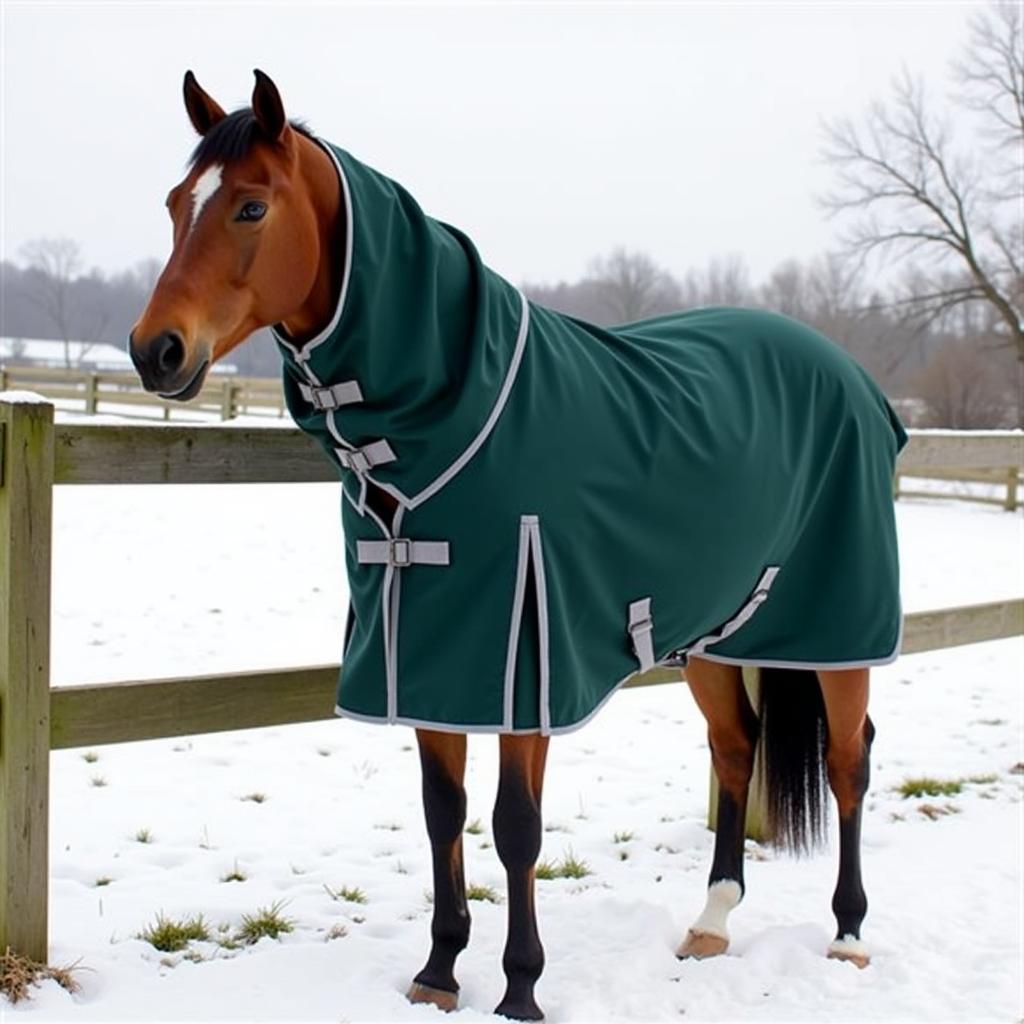Choosing the right horse blanket weight is crucial for your horse’s comfort and well-being, especially during the colder months. With so many options available, it can be overwhelming to determine the ideal blanket weight for your equine companion. This comprehensive guide will delve into the intricacies of Horse Blanket Weights, providing you with the knowledge to make informed decisions for your horse’s warmth and happiness.
Factors Influencing Blanket Weight Selection
Before we explore the different horse blanket weights, it’s essential to understand the factors that influence your choice:
- Climate: The most crucial factor is your geographical location and the prevailing climate. Horses in areas with harsh winters require heavier blankets compared to those in milder regions.
- Horse’s Coat: A horse’s natural coat plays a significant role in insulation. Horses with thick winter coats may need lighter blankets than those with finer coats.
- Age and Health: Older horses, young foals, and horses in poor health are more susceptible to the cold and might require heavier blankets.
- Living Conditions: Horses stabled indoors with limited turnout will need less insulation than those living primarily outdoors.
- Blanket Fit: A well-fitted blanket maximizes warmth and prevents drafts. An ill-fitting blanket can compromise insulation and cause discomfort.
Decoding Horse Blanket Weights
Horse blanket weights are typically measured in grams per square meter (gsm). The higher the gsm, the warmer the blanket. Here’s a general guide to common blanket weights:
Lightweight Blankets (50-150 gsm)
 Lightweight Horse Blanket
Lightweight Horse Blanket
Lightweight blankets are ideal for mild weather conditions or as a layering piece under heavier blankets. They provide minimal warmth and are suitable for:
- Taking the chill off on cool evenings
- Protecting horses from light wind and rain
- Keeping clipped horses clean
Medium-Weight Blankets (150-250 gsm)
Medium-weight blankets offer a balance of warmth and breathability. They are versatile and suitable for a wide range of temperatures, making them a popular choice for many horse owners. Consider a medium-weight blanket for:
- Moderate winter climates
- Horses with average coats
- Layering over stable sheets for added warmth
Heavyweight Blankets (300-400+ gsm)
 Heavyweight Horse Blanket
Heavyweight Horse Blanket
Heavyweight blankets provide maximum warmth and are essential for horses in frigid climates. These blankets feature substantial insulation and are suitable for:
- Harsh winter conditions with freezing temperatures
- Horses with thin coats or those living outdoors
- Older horses and those with health concerns
“When choosing a heavyweight blanket, it’s crucial to prioritize breathability to prevent overheating and moisture buildup,” advises Dr. Emily Carter, a leading equine veterinarian with over 20 years of experience.
Understanding Fill
Beyond weight, the type of fill significantly impacts a blanket’s warmth and breathability. Common fill materials include:
- Polyfill: Affordable, lightweight, and quick-drying, making it a popular choice for various blanket weights.
- Fiberfill: Offers excellent insulation and breathability, often used in medium to heavyweight blankets.
- Wool: A natural fiber known for its superior warmth and moisture-wicking properties, making it ideal for cold and wet climates. However, wool blankets require special care. Learn more about the benefits of wool horse blankets in our dedicated article.
Choosing the Right Size Horse Blanket
A well-fitted blanket is crucial for your horse’s comfort and safety. To determine the right size blanket for your horse, refer to our comprehensive guide on how to size your horse for a blanket.
Tips for Using Horse Blankets
- Introduce blankets gradually to allow your horse to acclimate.
- Check the weather forecast regularly and adjust blankets accordingly.
- Remove blankets daily to inspect your horse’s coat and allow for air circulation.
- Clean your horse’s blankets regularly to maintain their effectiveness and prolong their lifespan.
- Consider using horse fleece coolers after exercise to wick away moisture and prevent chills.
Conclusion
Choosing the appropriate horse blanket weight is essential for your horse’s well-being during colder months. By considering factors such as climate, your horse’s individual needs, and understanding the different blanket weights and fill options, you can make informed decisions to ensure your equine companion stays warm, comfortable, and healthy throughout the year.
FAQs
1. Do I need a blanket for my horse?
The need for a blanket depends on various factors like climate, your horse’s coat, and living conditions. Consult your veterinarian for personalized advice.
2. How do I know if my horse’s blanket fits correctly?
A well-fitted blanket should lie flat on your horse’s body without restricting movement or causing any rubbing.
3. Can I leave a horse blanket on all the time?
It’s not advisable to leave a blanket on your horse all the time. Remove it daily to check for any rubbing, allow for air circulation, and assess your horse’s body condition.
4. How often should I wash my horse’s blanket?
Cleaning frequency depends on usage and weather conditions. Aim to wash blankets at least once a month or more frequently if they become excessively dirty or soiled.
5. What should I do if my horse tears its blanket?
Remove the damaged blanket immediately and assess the severity of the tear. Minor tears can be repaired, while significant damage may require a replacement.
Need more assistance? Contact our team at Phone Number: 0772127271, Email: [email protected], or visit us at QGM2+WX2, Vị Trung, Vị Thuỷ, Hậu Giang, Việt Nam. Our customer service is available 24/7 to assist you.